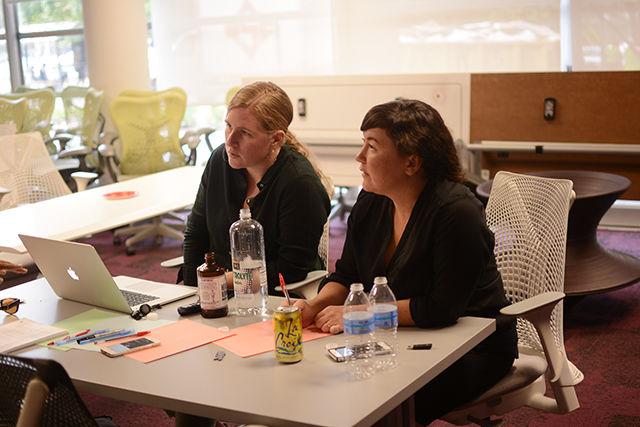NCSU Libraries’ second season of “Making Space” kicked off Wednesday with the hosts of “Criminal,” a podcast about true crime stories from everyday citizens across the country.
“Making Space” is a series of talks and workshops centered on women in STEM. Josephine McRobbie is the organizer of “Making Space” and assistant director and chief of staff at NCSU Libraries.
“[The series] exists to try to address the gap in the STEM fields, and in the maker community … of underrepresentation of women, of people of color, in our high tech spaces,” McRobbie said.
Since its inception, “Making Space” has hosted a variety of speakers to highlight the various roles of women in STEM fields and their innovations in makerspaces as science and technology advance.
Although geared toward women in STEM fields, the audience for the season’s first workshop and public talk had attendees from a variety of fields and backgrounds, interested primarily in learning about the podcasting process, and the history behind “Criminal.”
“I think having more women, who’ve been successful in fields like this, to be more visible, is essential in helping other people go after positions like that themselves, making it more accessible for them, and for them to see that it’s possible,” said Maria Adonay, a graduate student studying bioinformatics.
Phoebe Judge, one of the show’s creators and a producer, was adamant in emphasizing the women-driven aspect of “Criminal.”
“In this space, in the podcast world, that’s still a rarity that you would have a podcast that’s run primarily — that has been created by, hosted by, and also in a bigger sense, a business that’s owned by women,” Judge said.
The workshop, which consisted of a presentation about the technology used for podcasting, as well as a question and answer session between the speakers and the audience, offered attendees a comprehensive guide to starting a podcast from the beginning.
“STEM could really shine in this form of media,” said Martin Kurian, a senior studying environmental science. “So, having people, especially women, who can deliver a piece of information about the sciences and technology in a way that people can understand makes it more relatable, as well as grounded, and really includes and makes the information a lot more inclusive than, say, taking a college class.”
The series opened its second season with a workshop on how to start production of a podcast from the bottom up.
Judge and Lauren Spohrer, the other creator and producer of “Criminal,” spoke at the event, highlighting their journey as podcasters.
“[Judge and Spohrer] represent the intersection between communication and technology,” McRobbie said. “They do all of the behind-the-scenes work, and they also decipher some highly technical fields for the podcast and make them understandable for a general audience.”
Judge and Spohrer started “Criminal” in 2013, recording out of a closet in the evenings after working their day jobs. Both have extensive backgrounds in hosting and producing public radio, as well as, in Judge’s case, experience as a reporter.
With over three million listeners today, “Criminal,” of which the first episode was released in January 2014, was the first true crime-oriented podcast on the air.
“I think it’s a show about crime, ostensibly, but it’s always only ever a show about people, and how they got where they are,” Spohrer said. “We talk with people who’ve committed crimes and gotten caught, and with people who’ve committed crimes and not gotten caught, and who have been the victims of crimes. I think we’re always interested in learning more, uncovering more about the criminal justice system, and how sort of subjective and curious it is.”
“Making Space” has two more events coming up, including a workshop with GitHub’s February Keeney, who will be presenting on what it’s like to be a trans woman in technological makerspaces. For more information, go to the NCSU Libraries website and search “Making Space.”








